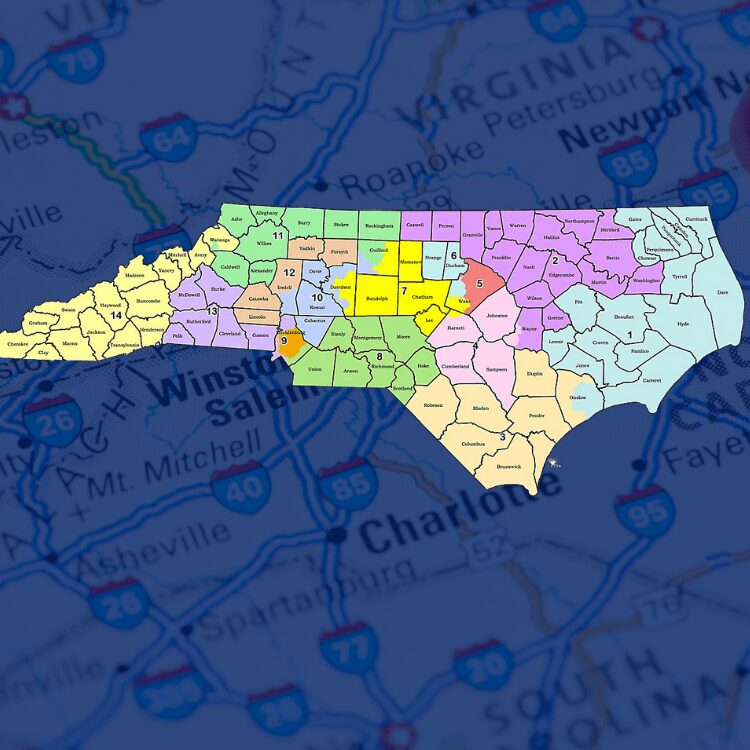Scholars, practitioners, advocates and students gathered recently at Duke University to examine the topic of redistricting. (That’s the process of drawing congressional boundaries.) It has become popular for the political party that is in power when it’s time for the district lines to be redrawn to draw the boundaries in their own favor.
The conference included judges and mathematicians, investigative reporters, activists, researchers and more. Each contributed insights to try and untangle the complex web that redistricting had become.
This episode includes comments from:
- James Andrew Wynn, judge on the U.S. Court of Appeals for the Fourth Circuit
- Jonathan Mattingly, James B. Duke Distinguished Professor of Mathematics, Duke University
- Tyler Dukes, Investigative Reporter, Raleigh News & Observer and Adjunct Instructor in the Sanford School of Public Policy
- Art Pope, Chairman, John William Pope Foundation
- Tom Ross, President, The Volcker Alliance and Co-Chair, North Carolinians for Redistricting Reform
Guest: Deondra Rose, Director of Polis, the Center for Politics at Duke University.
Conversation Highlights
Responses have been edited for clarity.
Redistricting advocate Tom Ross on the importance of people having confidence in district maps
I think where we have failed in the past is to figure out a solution for who draws the maps. And, again, I think the most important fact about who draws the maps is to have that be done by people that the public will have confidence in.
Art Pope on why independent commissions alone aren’t a perfect solution
Independent redistricting commissions themselves are not an assurance of no gerrymandering. We have states that have redistricting commissions that looking at the election results we argue that they were gerrymandered either inappropriately, or on purpose. There’s a lot of “devils in the details” that need to be worked out on independent redistricting commissions, and how to choose the members is one of the hardest situations we’ve seen.
Investigative Reporter Tyler Dukes on the importance of understanding that gerrymandering is not a black and white issue
When I have conversations about this with people, I think one of the things that I try to point out is that gerrymandering is in the concept of fairness, it’s not a binary, it’s not zero and one, it’s a spectrum, I think. And so the question is not, are we going to get fair maps? The question is not, are we going to have gerrymandered maps? The question is how extreme are those gerrymanders? How unfair are they? And trying to figure out what is acceptable to us in the balance of all these criteria.
Mathematician Jonathan Mattingly on thinking outside the box when it comes to how districts can be more fair
Right now we’ve been just analyzing here’s the rules that’s given to us what should we expect to see? Now is the question if we wanted to see something different how should we change the rules?
Deondra Rose, Director of Polis, on why this topic is central to democracy
This basic constitutional principle where each person should have the capacity to have her, his, or their interest represented in the halls of power is really central to democracy, what we aspire to be as a democracy, and yet politics often gets in the way. So if we’re entrusting politicians to write congressional districts to draw out these maps, there’s really no guaranteeing that they won’t factor in their own political interests when doing this important work.
- Subscribe to Policy 360 at Apple Podcasts, or wherever you get your podcasts
- Read conversation transcript
- Music: “Amber Glow” by Scott Holmes Music, licensed with permission from the Independent Music Licensing Collective – imlcollective.uk



ordering androxal purchase from uk
cheapest buy androxal generic online pharmacy
generic enclomiphene capsules price comparison
how to buy enclomiphene usa mastercard
order rifaximin generic rifaximins
cod rifaximin overnight saturday no prescription
how to buy xifaxan purchase discount
buy xifaxan generic usa
purchase staxyn generic sale
online order staxyn purchase to canada
canadian cheap avodart
avodart without prescription canada
buying dutasteride generic lowest price
buy cheap dutasteride generic pricing
online order flexeril cyclobenzaprine cheap uk
buy flexeril cyclobenzaprine canada
ordering gabapentin generic order
gabapentin price canada
sans ordonnance kamagra vendre acheter
kamagra livraison livraison le samedi
get fildena canada internet
fildena online perscriptions with no membership
cheap itraconazole cheap in canada
how to purchase itraconazole online
koupit kamagra japonsko
koupit kamagra bez lékařského předpisu